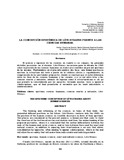| dc.rights.license | http://creativecommons.org/licenses/by-nc-sa/3.0/ve/ | es_VE |
| dc.contributor.author | Chacín de Rincón, Belkys | |
| dc.contributor.author | Ramírez Rondón, María Deborah | |
| dc.contributor.author | Rodríguez Carrero, Luis Alfonso | |
| dc.contributor.author | Rincón G., Ángel Gabriel | |
| dc.date.accessioned | 2018-11-27T20:50:47Z | |
| dc.date.available | 2018-11-27T20:50:47Z | |
| dc.date.issued | 2018-11-27 | |
| dc.identifier.issn | 0304-2820 | |
| dc.identifier.uri | http://www.saber.ula.ve/handle/123456789/45419 | |
| dc.description.abstract | El pensar y repensar de las ciencias en cuanto a sus campos, ha generado
distintas posiciones en el devenir. Lévi-Strauss incursiona para la década de 1960
sobre la posición de las ciencias humanas en el discurso científico en pro del episteme
de las mismas. Planteándose en el presente análisis dos fases, una formal que busca
mostrar la estructura del texto a partir de la retórica clásica y seguidamente, la
comprensión de los postulados propuestos, donde se concluye que el autor diferencia
entre los fines de las ciencias humanas y las sociales, y a su vez entre éstas y las
ciencias exactas y naturales, además de exponer como el estructuralismo es un eje
que permite la consolidación por los opuestos, llevando muchas veces a aparecer
subdisciplinas, que al final permitirán el ensamble que las hará indisolubles e
indiferenciables. | es_VE |
| dc.language.iso | es | es_VE |
| dc.rights | info:eu-repo/semantics/openAccess | es_VE |
| dc.subject | episteme | es_VE |
| dc.subject | ciencias humanas | es_VE |
| dc.subject | ciencias exactas y naturales | es_VE |
| dc.subject | LéviStrauss | es_VE |
| dc.title | La concepción epistémica de Lévi Strauss frente a las Ciencias Humanas | es_VE |
| dc.type | info:eu-repo/semantics/article | es_VE |
| dcterms.dateAccepted | 27/11/2016 | |
| dcterms.dateAccepted | 15/04/2016 | |
| dcterms.dateSubmitted | 11/10/2016 | |
| dcterms.dateSubmitted | 13/04/2016 | |
| dc.description.abstract1 | The thinking and rethinking of the sciences, in terms of their fields, has
generated different positions in the future. Lévi-Strauss ventures into the 1960s on
the position of the human sciences in scientific discourse in favor of their episteme.
Two phases are considered in the present analysis, a formal one that seeks to show
the structure of the text based on classical rhetoric and then, the understanding of the
proposed postulates, where it is concluded that the author differentiates between the
ends of the human and social sciences, and in turn between these and the exact and
natural sciences, in addition to exposing how structuralism is an axis that allows
consolidation by opposites, often leading to appear subdisciplines, which in the end
will allow the assembly that will make them indissoluble and indistinguishable | es_VE |
| dc.description.colacion | 55-59 | es_VE |
| dc.description.email | deborahrr@gmail.com | es_VE |
| dc.description.email | rinconga@ula.ve | es_VE |
| dc.identifier.depositolegal | PP76-0349 | |
| dc.identifier.edepositolegal | PP 201202ME4103 | |
| dc.subject.institucion | Universidad de Los Andes | es_VE |
| dc.subject.keywords | episteme | es_VE |
| dc.subject.keywords | human sciences | es_VE |
| dc.subject.keywords | exact and natural sciences | es_VE |
| dc.subject.keywords | Lévi-Strauss | es_VE |
| dc.subject.seccion | Revista Derecho y Reforma Agraria: Artículo | |
| dc.subject.thematiccategory | Ciencias Jurídicas y Políticas | es_VE |
| dc.subject.tipo | Artículos | es_VE |
| dc.type.media | Texto | es_VE |


